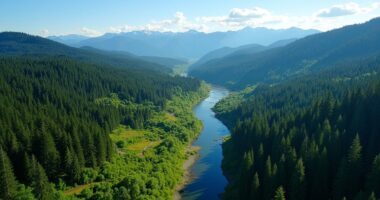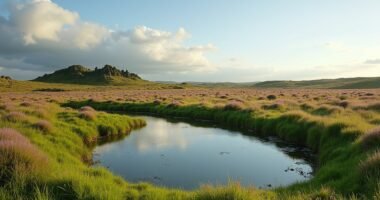The shift from grasslands to monoculture plantations reveals alarming ecological costs. Imagine replacing vibrant ecosystems with boring green carpets of sameness—thrilling, right? This transformation endangers nearly 25% of global biodiversity by reducing rich ecosystems to bland single-crop fields. Additionally, it disrupts moisture cycles, triggering wild weather like droughts and floods. It’s like playing Jenga with the climate: one wrong move, and everything tumbles down. Stick around to discover more about the fascinating connections between trees and our environment.
The Ecological Impact of Deforestation
In the grand tapestry of our planet’s ecosystems, trees are the vibrant threads that weave together a multitude of environmental benefits, from carbon storage to biodiversity support.
However, the alarming trend of deforestation, especially the shift from lush grasslands to monoculture plantations, presents a dire ecological cost that cannot be ignored.
Imagine this: every year, a staggering 15 billion trees are chopped down, equating to an area roughly the size of the UK disappearing from our planet in 2019 alone.
Every year, 15 billion trees vanish, erasing an area the size of the UK from our planet.
If that doesn’t give you pause, consider that deforestation contributes to 12-20% of global greenhouse gas emissions, creating a smoggy blanket over our atmosphere.
The Amazon rainforest, often dubbed the “lungs of the Earth,” is particularly vulnerable.
In 2022, Brazil lost 1.8 million hectares of primary forest, releasing 1.2 gigatonnes of carbon dioxide—twice as much as your neighbor’s annual fossil fuel emissions!
This transformation of diverse ecosystems into barren monocultures not only disrupts our carbon sinks but also threatens nearly 25% of global biodiversity.
Imagine a vibrant neighborhood suddenly reduced to a row of identical houses.
Boring, right? That’s what happens when we sacrifice unique ecosystems for uniformity.
Moreover, these changes ripple across the globe.
Deforestation alters moisture absorption and release processes, which can skew regional rainfall patterns, leading to extreme weather events like droughts or floods.
It’s as if we’re playing a game of Jenga with our climate, pulling out critical pieces without a thought to the collapse that may follow.
Yet, not all is lost.
With thoughtful forest management and reforestation efforts, we can mitigate some of the damage.
By treating forests as renewable resources rather than disposable commodities, we can restore some ecological balance.
In fact, tropical primary forest loss reached 4.1 million hectares in 2022, highlighting the urgent need for action.
The implementation of sustainable management practices offers promising paths to protect our remaining forests while supporting human needs and livelihoods.
However, time is of the essence; the clock is ticking, and every moment we delay is another step toward an irreversible tipping point.
In this high-stakes game of ecological chess, the right moves could still lead us toward a brighter, greener future.
Interestingly, net forest loss is currently estimated at 4.7 million hectares per year globally, underscoring the urgency of addressing deforestation.









